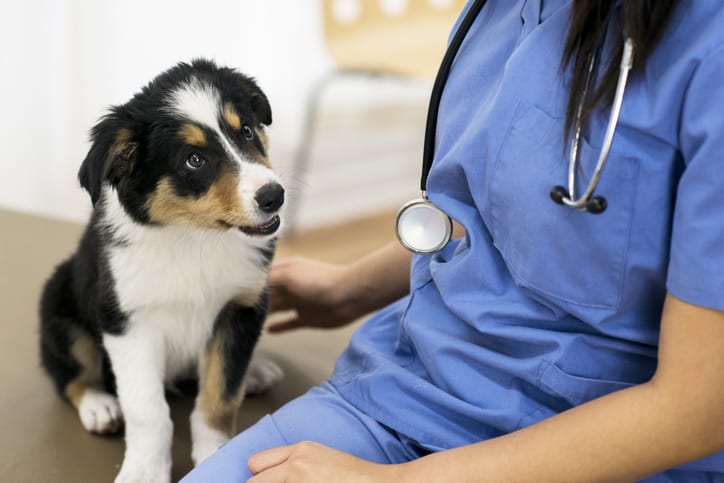Your Guide to Needed Dog Vaccinations in Canton, GA
It’s important to follow a complete vaccination schedule to ensure that your dog stays healthy, and is no danger of contracting viruses that may be harmful or even deadly. Several essential, or core vaccines are recommended for your dog, and one in particular, rabies, is required under the law in many states.
The Purpose of Dog Vaccines
The function of a dog vaccine is to trigger an immune response to a certain virus that can help protect your pet from future infections and diseases. A vaccine triggers the body’s immune response to produce antibodies that can battle viruses. Keeping your dog up-to-date on vaccines will ensure that your best friend will enjoy a healthier and happier life.
Dog vaccines help prepare the body’s immune system to fight the invasion of disease-causing organisms. Vaccines contain antigens, which look like the disease-causing organism to the immune system but don’t cause disease. When the vaccine is introduced to the body, the immune system is mildly stimulated. If a pet is ever exposed to the actual disease, her immune system is now prepared to recognize and fight it off entirely or reduce the severity of the illness.

Core Dog Vaccinations
For the first year, it’s important to make sure that your dog is safe from viruses and disease, and as your dog matures, it’s important to keep up with a regular vaccine schedule. Below are listed the essential, or “core” vaccines that are recommended for your dog.
Rabies
Rabies is a virus that attacks the central nervous system. Symptoms include excessive drooling, paralysis, anxiety, and ultimately death. It is also a zoonotic disease that can be transmitted to humans and other pets. Due to its deadly nature and capability to transfer to humans, rabies vaccines, or appropriate rabies titers (a measurement of rabies antibodies in the blood) are required in most cities and states in the US. If you have any questions about the rabies vaccine, please contact your veterinarian.
Parvovirus
Parvovirus, or “Parvo,” is a highly contagious virus that affects all dogs, but unvaccinated dogs and puppies less than four months of age are most at risk. Parvo attacks the gastrointestinal system and creates a loss of appetite, vomiting, fever, and often severe, bloody diarrhea. The vomiting and diarrhea can be acute and cause severe dehydration in a matter of hours, so contacting your veterinarian immediately is crucial. Your veterinarian can conduct a parvo test to see if your dog does have parvo and can hospitalize your pet to keep her hydrated, and prevent the possibility of secondary bacterial infections. Parvo is an extremely contagious virus and can live indoors for several weeks, and in the outdoor environment for many months, even years in areas shaded from direct sunlight.
Canine Distemper
The distemper virus attacks the respiratory, gastrointestinal, and nervous systems of dogs, and this virus is spread through airborne droplets through sneezing or coughing. Distemper can also be transmitted by sharing water bowls, and infected dogs can shed the virus for months. Distemper can cause discharge from the eyes and nose, fever, coughing, vomiting, diarrhea, seizures, twitching, paralysis, and sometimes death. Young dogs that contract distemper require hospitalization and supportive care, and medications to help relieve secondary infections and seizures. Dogs can survive distemper, however, they will often exhibit neurological deficits throughout their lives.
Canine Adenovirus (Hepatitis)
Canine hepatitis is another very contagious virus that affects the liver, kidneys, spleen, lungs, and eyes. This disease primarily attacks the liver, and symptoms range from a low-grade fever, congestion and stuffy nose, vomiting, jaundice, stomach enlargement, and pain around the liver. Many dogs can overcome a mild bought of hepatitis, but more severe forms can damage the liver and even cause death.
Bordetella Bronchiseptica
Bordetella is the number one cause of “kennel cough.” Bordetella is a bacterium that is highly contagious and can cause coughing fits, vomiting, and in rare cases seizures. The vaccines for kennel cough can be intranasal, injectable, and oral and may include protection against other causes of kennel cough such as Parainfluenza and Adenovirus. If you plan on boarding your dog in a kennel, or enroll in training classes, or plan on using dog daycare services, the Bordetella vaccine is recommended and often required by kennels and training facilities. Most Bordetella vaccines are good for 6 to 12 months.
Non-Core Dog Vaccinations
Depending on where you live, your veterinarian may recommend any or all of the non-core dog vaccines listed below.
Lyme Disease
Lyme disease is a tick-borne disease caused by a bacterium known as a spirochete. The tick is the natural host of this bacterium and is transmitted to animals by a tick bite. Symptoms of Lyme disease include limping, enlarged lymph nodes, no appetite, and a low-grade, intermittent fever. Lyme disease attacks the heart, joints, and kidneys, and can cause neurological signs. If you suspect that your dog has been exposed to Lyme disease, contact your local veterinarian. Lyme disease can be treated effectively with antibiotics, but it is not uncommon for pets to have relapses later in life.
Canine Parainfluenza
Canine parainfluenza is one of several viruses that can cause what is known as “kennel cough.” Canine parainfluenza targets the respiratory system, and it is very contagious and can be contracted in kennels, dog parks, and other areas where many dogs come into contact with one another.
Leptospirosis
Leptospirosis is a bacterium and is a zoonotic disease that can be spread from animals to humans. It lives in the soil and water and is more common in parts of the US where there are a lot of rivers, streams, and more rain-fall than drier areas. Symptoms of leptospirosis include vomiting, fever, abdominal pain, diarrhea, loss of appetite, lethargy, jaundice, muscle pain, and kidney and/or liver failure. If not treated, leptospirosis can be deadly. If you suspect that your dog may have leptospirosis, contact your veterinarian immediately. Your veterinarian can prescribe antibiotics which can help save your dog’s life.
Vaccination Schedule for Dogs
Depending on where you live, the dog vaccination schedule may differ. Some pets may not need every vaccine listed above, and it is always best to consult your veterinarian as to which vaccines are needed for your dog.
Below is listed the generally accepted core vaccine schedule for dogs up to one year and after.
| Dog Age | Core Vaccines |
| 6-8 weeks | DAP (Distemper, Adenovirus, parvovirus) |
| 10-12 weeks | DAP |
| 16-18 weeks | DAP, 1-year Rabies |
| 12-16 months | DAP, 3-year Rabies |
| Every 3 years | DAP |
| Every 1-3 years | Rabies |
The Cost of Dog Vaccinations
The cost of dog vaccines may vary, and the cost depends on several factors such as where you live. Veterinarians in large urban areas may charge more than a veterinarian in a smaller community. However, many shelters and veterinary clinics do offer low-cost vaccine clinics.
Do Dog Vaccinations Have Side Effects?
Some dogs can experience side effects such as a mild fever, swelling at the vaccine site, lethargy, decreased appetite, coughing, or sneezing. These reactions usually start within hours of vaccination, and if they last for more than 24-48 hours, or if your pet is experiencing discomfort, please contact your veterinarian. If your pet experiences more severe side-effects such as vomiting, diarrhea, hives, swelling of the nose, or collapse, contact your veterinarian immediately as these could be signs of a life-threatening emergency.
Call (770) 479-7141 to talk with your veterinarian at Riverstone Animal Hospital about dog vaccinations in Canton, GA today!
